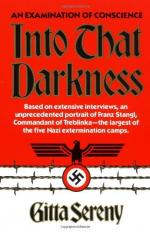
|
| Name: _________________________ | Period: ___________________ |
This test consists of 5 short answer questions, 10 short essay questions, and 1 (of 3) essay topics.
Short Answer Questions
1. When the author met Stangl how long had he been in prison, which was mostly spent in solitary confinement?
2. According to Stangl how old was the boy in the children's facility where the Mother Superior couldn't understand why the boy was rejected for a "mercy killing"?
3. In what year did Hitler issue his vague order to army command in Russia covering the execution of large numbers of undesirables, primarily Jews (though unstated)?
4. After cleaning up the mess at a Euthanasia institute Stangl reported to T4 for new orders and chose to go to Lublin where he reported to what SS officer?
5. In October 1941 Stangl was sent to "clean up" what Euthanasia institute?
Short Essay Questions
1. What was Hitler's speech about, as detailed in the fist chapter of Part Two of the book?
2. Who was Brack in relation to T4 and Stangl?
3. What did Stangl reveal about his orders to report to T4 and his knowledge of T4's purpose?
4. How did the Nazi plans for "Final Solution" come to be during the invasion of Russia?
5. How did Stangl's family come to stay in Chelm for a period of time while he was working at Sobibor?
6. What did the author learn about the former SS HQ when she visited the site in Lublin in March 1972?
7. What body officially approved the four extermination camps and what was the name of each camp?
8. Only who had a chance of surviving the four death camps and how many actually survived?
9. How did Professor Mayer end up writing the opinion about Catholic Church opposition to euthanasia?
10. What was done in euthanasia institutes after T4 was officially stopped by Hitler?
Essay Topics
Write an essay for ONE of the following topics:
Essay Topic 1
At one point in the book it was observed that just as the prisoners were trying to survive the camps, so were Franz Stangl and the other free men assigned to work at Treblinka. What details in the book illustrate that point, and how was this cultivation for survival reflected in their attitudes, daily operations, etc.?
Essay Topic 2
Explain the relationship between social Darwinism and the Euthanasia and Extermination Programmes as presented within the book.
Essay Topic 3
Frau Stangl wanted her husband to escape his prison situation and he was reluctant. How did this compare to earlier in the book when a man told some Jews he has in the woods he would rather they run off than get killed, but the Jews came back anyway? How did Frau Stangl convince her husband to finally leave his prison situation?
|
This section contains 818 words (approx. 3 pages at 300 words per page) |

|




